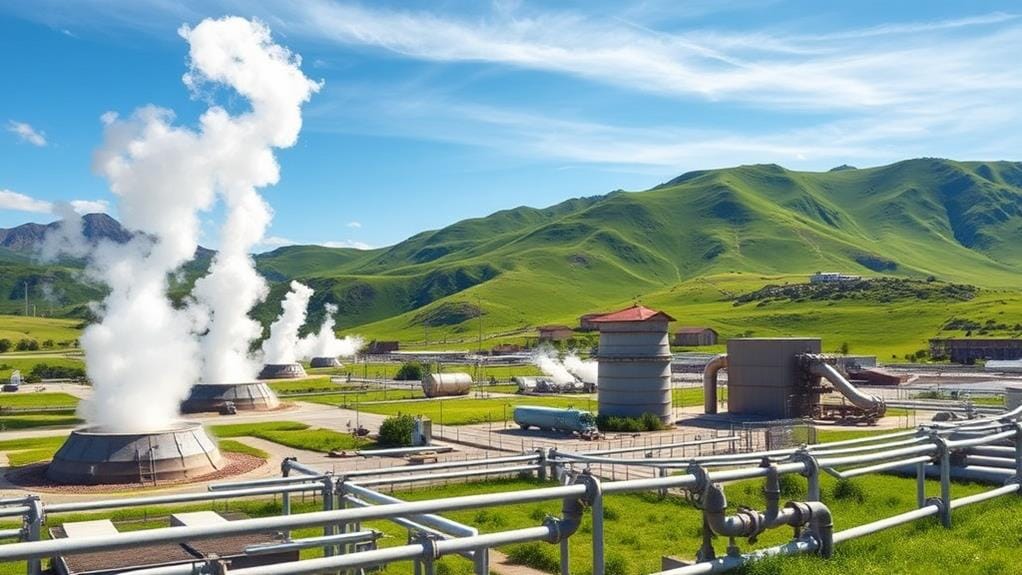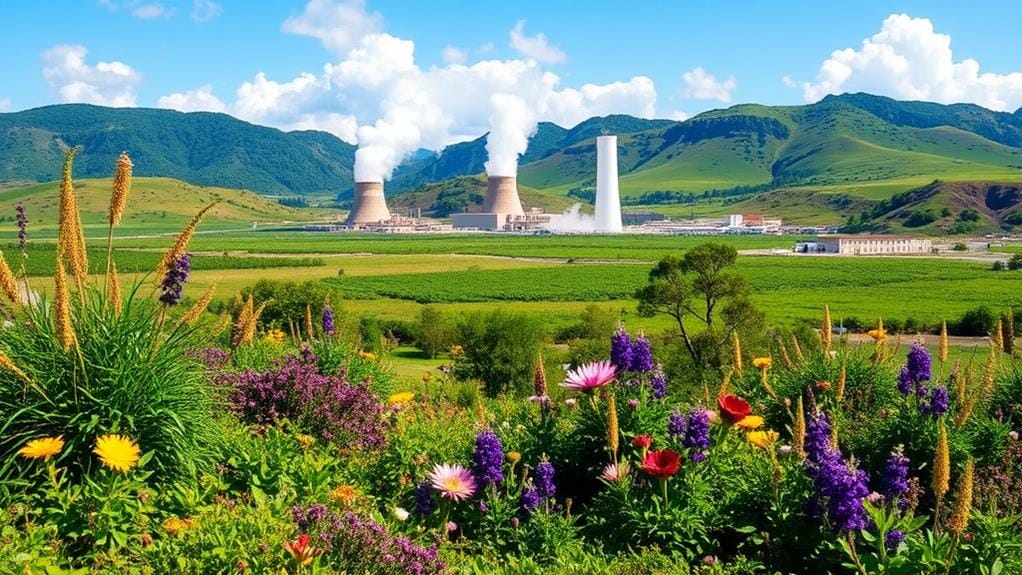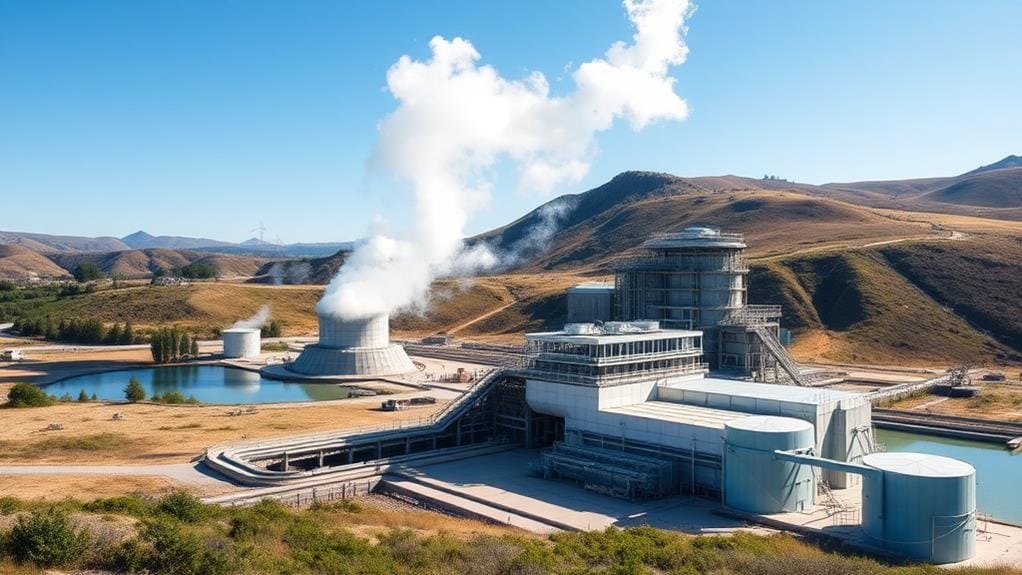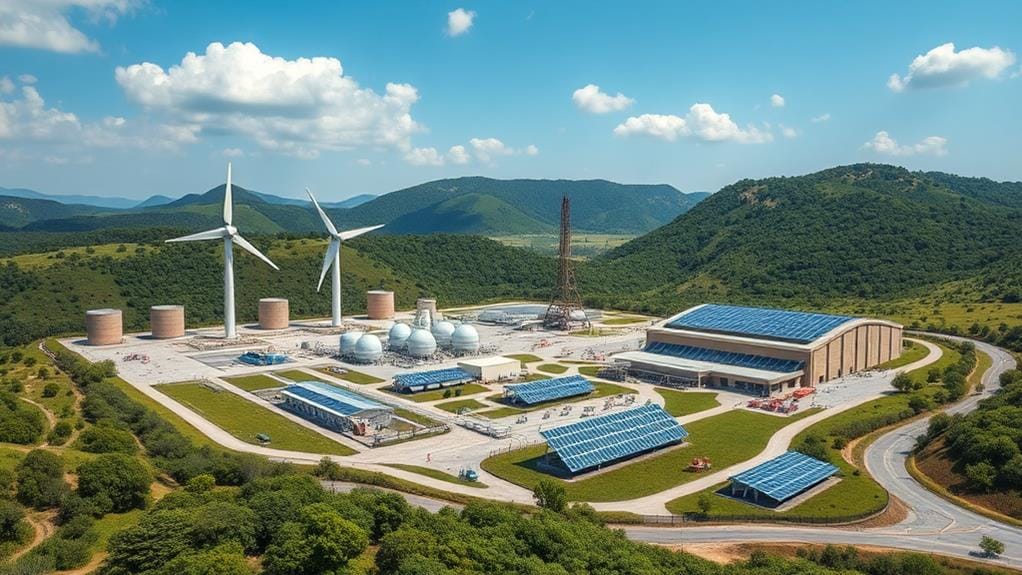Geothermal power plants are highly efficient due to their utilization of Earth's internal heat, which allows for continuous energy generation. With capacity factors often exceeding 90%, these plants provide a reliable baseload power supply that surpasses the intermittency of wind and solar sources. Advanced technologies, such as binary Organic Rankine Cycle (ORC) systems, enhance energy extraction from lower temperature fluids, improving overall thermal efficiency. In addition, minimal operational costs due to low maintenance requirements, combined with long lifespans of 80-100 years, contribute to their economic viability. Exploring geothermal technology reveals even more benefits and future potential in efficient energy solutions.
Key Takeaways
- Geothermal power plants have high capacity factors, often exceeding 90%, enabling consistent and reliable power generation.
- Advanced heat conversion technologies, like binary ORC, maximize energy extraction from low-temperature geothermal fluids.
- Enhanced geothermal systems (EGS) create artificial reservoirs, expanding the accessible geothermal resource potential.
- Low operational costs arise from minimal maintenance needs and efficient resource management techniques.
- Geothermal plants emit virtually zero emissions, contributing to a cleaner energy profile compared to fossil fuels.
Geothermal Energy Basics
When we think about renewable energy, geothermal energy often comes to mind as a powerful yet underappreciated resource. Derived from the Earth's internal heat, geothermal energy is harnessed through geothermal power plants for electricity generation and heating applications. These plants operate with high capacity factors, often exceeding 90%, providing a reliable alternative to intermittent renewable energy sources. The primary types of geothermal power plants—dry steam, flash steam, and binary cycle—vary in efficiency, with binary cycle plants excelling at lower temperatures. Additionally, geothermal heat pumps utilize stable subsurface temperatures for energy-efficient heating and cooling. Enhanced geothermal systems (EGS) further extend geothermal energy's potential by enabling heat extraction from hot rock formations, thereby broadening its applicability and effectiveness in our energy landscape.
Continuous Power Generation

In exploring continuous power generation, we recognize that geothermal power plants provide a baseload energy supply, operating around the clock with an impressive capacity factor often exceeding 90%. This capability guarantees a predictable output stability, which is essential for grid reliability, allowing these plants to meet fluctuating energy demands effectively. With their inherent operational advantages, geothermal facilities not only enhance overall grid stability but also represent a strategic asset in long-term energy planning.
Baseload Energy Supply
How can we guarantee a reliable and consistent energy supply in an increasingly renewable-driven world? Geothermal power plants stand out as a formidable solution for providing baseload energy supply, operating continuously to meet our continuous energy demands 24/7. With high-capacity factors often exceeding 90%, these plants guarantee stable power output, which notably supports grid stability. Unlike intermittent sources such as wind and solar, geothermal energy generation is predictable and consistent, allowing for effective energy planning and management. Over their operational lifespan of 80-100 years, they can replace or complement fossil fuels, making them essential in our shift to sustainable energy. By harnessing geothermal resources, we can confidently address our energy needs while minimizing environmental impact.
Predictable Output Stability
With geothermal power plants, we tap into a reliable source of energy that operates continuously, ensuring a stable electricity supply around the clock. This predictable output greatly contributes to grid stability, making geothermal energy an effective solution for baseload energy demand.
Consider the following advantages:
- High capacity factors exceeding 90%, ensuring consistent power generation.
- Utilization of Earth's internal heat for stable and reliable energy output.
- Reduction of variability typically seen in other renewable energy technologies.
- Essential for energy planning and management, accommodating steady demand without fluctuations.
24/7 Operational Capability
Geothermal power plants boast a remarkable operational capability, delivering continuous power generation that sets them apart from other renewable sources. With high-capacity factors exceeding 90%, these plants efficiently meet baseload energy demand, ensuring reliable electricity generation around the clock. This stability is critical for grid stability, as geothermal systems maintain consistent operational output, reducing our reliance on intermittent sources like wind and solar. The longevity of geothermal plants, often operating for 80-100 years, further enhances their role in effective energy planning, allowing us to rely on sustained power generation over time. By harnessing geothermal energy, we contribute to a more stable and predictable energy landscape, ultimately supporting a sustainable future for all.
Advanced Technologies Enhancing Efficiency

As we explore advanced technologies enhancing efficiency in geothermal power plants, it is crucial to recognize the pivotal role of innovative heat conversion methods, enhanced system design features, and improved resource management techniques. For instance, the implementation of binary ORC technologies allows us to maximize energy extraction from low-temperature geothermal fluids, while enhanced geothermal systems (EGS) create artificial reservoirs in previously untapped areas, potentially revealing substantial geothermal energy resources. By integrating these advancements, we can greatly boost the overall performance and reliability of geothermal power generation, ultimately contributing to a more sustainable energy landscape.
Innovative Heat Conversion Methods
In exploring innovative heat conversion methods, we find that advanced technologies are revolutionizing the efficiency of geothermal power plants. By utilizing binary geothermal power plants and the Organic Rankine Cycle (ORC), we can efficiently convert low-temperature geothermal resources into electricity. Enhanced geothermal systems (EGS) also play a significant role in maximizing heat extraction from previously untapped geothermal resources. Key advancements include:
- Enhanced heat exchanger designs that reduce heat loss
- Improved thermal transfer techniques
- Advanced modeling for precise energy performance predictions
- Optimized system designs that adapt to diverse geothermal conditions
These innovations not only boost overall energy output but also enable more sustainable geothermal power generation, ensuring we're tapping into the full potential of our geothermal resources responsibly and effectively.
Enhanced System Design Features
There's a growing recognition of how enhanced system design features can greatly elevate the efficiency of geothermal power plants. By implementing advanced technologies, enhanced geothermal systems (EGS) optimize heat extraction, creating artificial reservoirs that boost energy generation. Remarkably, binary cycle power plants use a secondary working fluid with a lower boiling point, greatly improving conversion efficiencies. Innovative closed-loop systems minimize heat loss during fluid transport, enhancing thermal efficiency and reducing operational costs. Additionally, advanced heat exchangers and turbine technologies have led to impressive conversion efficiencies, with some binary plants reaching up to 21%. Continuous monitoring and adaptive control systems further optimize operational parameters for consistent performance across varying geological conditions.
| Feature | Benefit |
|---|---|
| Enhanced Geothermal System | Optimized heat extraction |
| Binary Cycle Power Plants | Higher conversion efficiencies |
| Closed-loop Systems | Reduced heat loss |
| Advanced Heat Exchangers | Improved thermal efficiency |
| Adaptive Control Systems | Consistent operational performance |
Improved Resource Management Techniques
Improving resource management techniques is essential for enhancing the efficiency of geothermal power plants. By adopting advanced technologies, we can considerably optimize our operations and maximize energy output. Key improvements include:
- Enhanced fluid pathways in Enhanced Geothermal Systems (EGS), releasing previously inaccessible resources.
- The use of binary cycle power plants, which utilize a secondary fluid to generate energy from low-temperature geothermal sources, minimizing turbine stress.
- Innovations in drilling techniques that reduce costs and extend geothermal well lifespans, decreasing resource depletion rates.
- Implementation of advanced monitoring systems, allowing real-time optimization and reducing downtime, thereby improving energy conversion rates.
These strategies not only boost energy efficiency but also pave the way for integrating hybrid systems, ensuring sustainable resource management in the long term.
Environmental Benefits and Impact

Geothermal power plants stand out as a beacon of sustainable energy, showcasing significant environmental benefits and a minimal impact on our planet. By utilizing geothermal energy systems, we achieve drastically lower CO2 emissions compared to fossil fuels, potentially avoiding greenhouse gas emissions equivalent to millions of cars. Importantly, binary-cycle geothermal plants emit virtually zero emissions, promoting clean energy and further minimizing environmental impact. Additionally, with projected water usage accounting for only 1.1% of power-sector withdrawals by 2050, these plants have a comparatively low impact on water resources. Furthermore, the visual impact of geothermal plants is minimal, allowing for seamless integration into communities while maintaining a smaller land footprint and low landscape disruption, making them a viable choice for renewable energy development.
Economic Advantages of Geothermal

With a solid foundation in environmental benefits, we can now explore the economic advantages of geothermal energy. Geothermal plants provide compelling economic viability through several factors:
- High-capacity factors often exceeding 90%, facilitating quicker cost recoupment.
- Relatively low operational costs due to minimal maintenance requirements.
- Significant job generation, with each installed megawatt creating approximately 34 jobs.
- Impressive annual energy outputs, as binary geothermal plants can yield around 632 million kWh, resulting in lower emissions compared to fossil fuels.
Moreover, the estimated total cost of geothermal binary power plants is around $625 million, showcasing a 32.2% cost reduction compared to single flash plants. This positions geothermal energy as a cost-effective and sustainable option within the renewable energy sector.
Reliability and Safety Features

Although many energy sources face challenges with reliability, geothermal power plants stand out for their consistent performance and safety features. These plants provide a stable energy supply, greatly enhancing grid reliability without the fluctuations typical of wind and solar. Their closed-loop designs minimize maintenance needs, ensuring high reliability and reducing downtime. With extensive operational experience, geothermal technology is adept at withstanding environmental changes, operating efficiently for decades. Additionally, safety features such as self-regulating pressure systems are crucial, as they mitigate the risk of leaks and environmental contamination. By eliminating the need for fuel, geothermal plants also diminish fire risks, making them a safe and reliable choice for sustainable energy production.
Comparison With Other Energy Sources

When we look at energy sources, geothermal power plants consistently outperform many alternatives regarding reliability and efficiency. With capacity factors of 90% or higher, they provide dependable energy generation compared to solar and wind sources, which may only achieve 20% to 50%. Additionally, while geothermal energy boasts an average conversion efficiency of 12%, it remains a stable baseload power source. Here are some key comparisons:
- Emissions from electricity: Geothermal plants emit virtually zero emissions.
- Operational costs: Maintenance is considerably lower than that of solar panels.
- Land footprint: Geothermal uses about 160 m²/GWh, whereas solar can require up to 4,000 m²/GWh.
- Renewable energy resources: Geothermal provides consistent output, unlike intermittent sources.
These factors highlight geothermal energy's position as a leading renewable resource.
Future Innovations in Geothermal Energy

The future of geothermal energy is bright, driven by innovative technologies set to revolutionize the industry. Enhanced geothermal systems (EGS) promise to access over 100 GW of potential by utilizing hot rock resources across the nation, greatly expanding our renewable energy capabilities. Additionally, advancements in deep direct-use technologies will modernize district heating systems, delivering efficient heating solutions for large infrastructures such as hotels and hospitals. Machine learning applications are being integrated to optimize heat transfer and predictive modeling, enhancing the efficiency and reducing operational costs of geothermal systems. Ongoing research and development into hybrid configurations, combining geothermal, solar, and biomass energy, are set to improve the sustainability and effectiveness of geothermal energy, positioning it as a key player in our energy future.
Frequently Asked Questions
Why Is Geothermal Energy Most Efficient?
When we explore why geothermal energy's so efficient, we find it harnesses the earth's core for sustainable energy. Using closed-loop systems, it minimizes environmental impact while maximizing resource availability and energy conversion in heating systems.
What Is the Efficiency of Geothermal Power Plants?
When we consider the efficiency of geothermal power plants, we find that energy conversion varies widely. By focusing on heat extraction and embracing technology advancements, we can address sustainability issues while managing costs and minimizing environmental impact together.
Why Are Geothermal Power Plants Usually More Efficient Than Fossil Fuel Burning Power Plants?
Imagine a garden thriving on geothermal heat; it's sustainable and low-maintenance. Just like that, geothermal plants harness renewable resources, minimizing operational costs and carbon footprints, thanks to smart site selection and advancing technology, ensuring energy sustainability.
What Are 5 Advantages and Disadvantages of Geothermal Energy?
When we consider geothermal energy, we see its economic benefits, low environmental impact, and energy sustainability. However, challenges like land use, water consumption, and geographical limitations remind us of the importance of community involvement and technological advancements.




